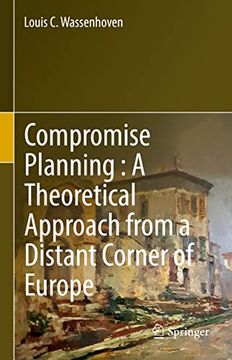Synopsis "Compromise Planning: A Theoretical Approach From a Distant Corner of Europe"
The purpose of the book is to elaborate a planning theory which departs from the plethora of theories which reflect the conditions of developed countries of the North-West. The empirical material of this effort is derived from a country, Greece, which sits on the edge between North-West and South-East, at the corner of Europe. No doubt, there is extensive international literature on planning theory in general from a bewildering variety of viewpoints. The interested professional or student of urban and regional planning is certainly aware of the dizzying flood of books, articles and research reports on planning theory and of their never-ending borrowing of obscure concepts from more respectable scientific disciplines, from mathematics to philosophy and from physics to economics, human geography and sociology. He or she probably observed that there is a growing interest in theoretical approaches from the viewpoint of the so-called "Global South". The author of the present book has for many decades faced the impasse of attempting to transplant theories founded on the experience of the North-West to countries with a totally different historical, political, social and geographical background. He learned that the reality that planners face is unpredictable, patchy, and responsive to social processes, frequently of a very pedestrian nature. Planning strives to deal with private interests which planners are keen to envelop in a single "public interest", which is extremely hard to define. The behaviour of the average citizen, far from being that of the neoclassical model of the homo economicus, is that of an individual, a kind of homo individualis, who interacts with the state and the public administration within a complex web of mutual dependence and negotiation. The state and its administrative apparatus, i.e., the key-determinants and fixers of urban and regional planning policy, bargain with this individual, offer inducements, exemptions, derogations and privileges, deviate unhesitatingly from their grand policy pronouncements, but still defend the rationality and comprehensiveness of the planning system they have legislated and operationalized. It is by and large a successful modus vivendi, but only thanks to a constant practice of compromise. Hence, the term compromise planning, which the author coined as an alternative to all the existing theoretical forms of planning. This is the sort of planning, and of the accompanying theory, with which he deals in this book. It is the outcome of experience and knowledge accumulated in a long personal journey of academic teaching in England and Greece, research, and professional involvement.

